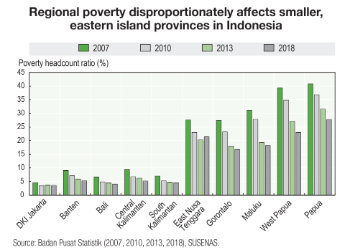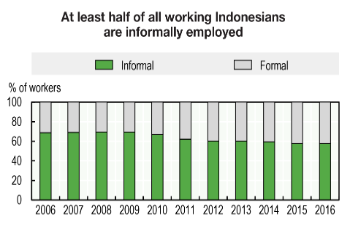Inclusive societies and development
Social Protection System Review (SPSR) of Indonesia... in 60 seconds

What is the Social Protection System Review of Indonesia?
The Social Protection System Review (SPSR) of Indonesia assesses the current state of Indonesia’s social protection system, highlights current and future challenges, and suggests a number of options for addressing them.
In the report, you will find:
- analysis of the national context, focusing on poverty,
- inequality and lifecycle risks
- a mapping of the social protection system
- assessment of its impact on poverty and inequality
- analysis of its financial sustainability
- recommendations for strengthening the system
The review is part of the EU Social Protection Systems Programme (EU-SPS), co-financed by the European Union, the OECD and the Government of Finland. Other country reviews are available from the project’s website http://www.oe.cd/social-protection
What are Indonesia's social protection needs?
|
Indonesia’s economic development has not benefited the entire population Indonesia’s recovery from the 1997 Asian Financial Crisis has led to an impressive reduction in poverty and a significant improvement in living standards. However, the decline in poverty slowed significantly after 2010, with 38.2% of the population remaining poor or vulnerable. At the same time, inequality rose strongly until recently.
Social protection is at the centre of Indonesia’s inclusive growth strategy Since 2000, Indonesia has made great progress towards establishing a social protection system that covers a wide range of risks as part of its strategy to promote inclusive growth as a critical enabler of the country’s continued economic and social development. Yet it is not operating at its full potential. Households eligible for PKH are also entitled to complementary initiatives to promote their sustainable exit from poverty, including scholarships, free health insurance and subsidised rice. However, it is rare that poor individuals benefit from all these programmes, due to institutional fragmentation and uneven use of the Unified Database (UDB), which has been developed since 2005 as a common targeting mechanism for social assistance. Indonesia’s social insurance programmes, such as retirement pensions and health insurance, are well established, and the government is taking steps towards reducing coverage gaps. The national health insurance system, JKN, is making extraordinary progress towards universal health coverage, covering three quarters of the population as of October 2018. However, there are concerns regarding its long-term sustainability. At the same time, a new pension system is struggling to increase coverage amongst Indonesia’s large informal sector. Active labour-market policies are required to enhance the skills and productivity of poor, vulnerable and marginalised workers, but these are currently implemented at a relatively small scale. Meanwhile, passive labour policies, such as minimum wages and severance pay, risk distorting the labour market and compliance is low. Severance pay is considered a constraint to hiring and firing workers, while minimum wages are high relative to the median wage. Over the coming decades, Indonesia’s elderly population is expected to grow rapidly. This means that the focus on alleviating child poverty will shift over time to programmes for older people. Increasing coverage of contributory pensions is a policy priority of Indonesia but will be difficult to achieve, especially for individuals closer to retirement today. Demand for alternative approaches to ensuring welfare in old age is likely to intensify.
Indonesia is realising its commitment to establish a social protection system. Important progress has been made in strengthening coherence and coordination across a number of dimensions, including legislation, policies and institutions. However, financing for social protection is low by international standards, reflecting the country’s weak domestic resource mobilisation. |
|
Did you know...? The challenge of reducing poverty is in part a result of the major economic disparities across the country: in 2018, the poverty rate in Jakarta was below 4% but exceeded 20% in a number of eastern provinces. Did you know...? The majority of the Indonesian workforce is informally employed: in 2016, the informality rate stood at 57%. Informal workers (and their families) often find themselves in the “missing middle” of social protection coverage, whereby they are ineligible for poverty-targeted social assistance but excluded from employment-based contributory arrangements.
|
What can the government do?
Strengthen social insurance coverage of the “missing middle”
- Adopt a dual approach to include employees and own-account workers in the informal sector.
- Subsidise social security contributions of informal workers by covering the cost of employment injury arrangements.
- Leverage JKN enrolment and awareness raising efforts to increase pensions coverage.
Strengthen the information architecture for social protection
- Continue to develop and coordinate mechanisms for regular updating and verification of the UDB, for example through one-stop shops and on-demand application.
- Use UDB as a basis for disaster response mechanisms to protect the most vulnerable as part of integration of social protection into disaster risk management strategies.
- Improve the reach of civil registration services to increase the proportion of individuals (especially in poor remote areas) with identification documents.
Regularise and strengthen social services
- Implement the legislative framework for the provision of social services according to a guaranteed minimum level of services for specified vulnerable groups.
- Decentralise training for social workers to ensure they are able to deliver services during periods of change in social policy.
- Prioritise provision of early childhood development infrastructure and services, including family visits to PKH recipients.
Leverage social protection to offset gender disparities
- Design specific active labour market policies for women not in education, employment or training.
- Consider incorporating care credits in the pension system.
- Consider earlier eligibility age for elderly social assistance for women.
Reconfigure labour market interventions to meet the needs of Indonesia today
- Revise severance pay while enforcing pension contributions, especially among SMEs.
- Consider the establishment of an unemployment insurance fund.
- Invest in active labour-market policies to promote productivity among vulnerable workers.
Related Documents

